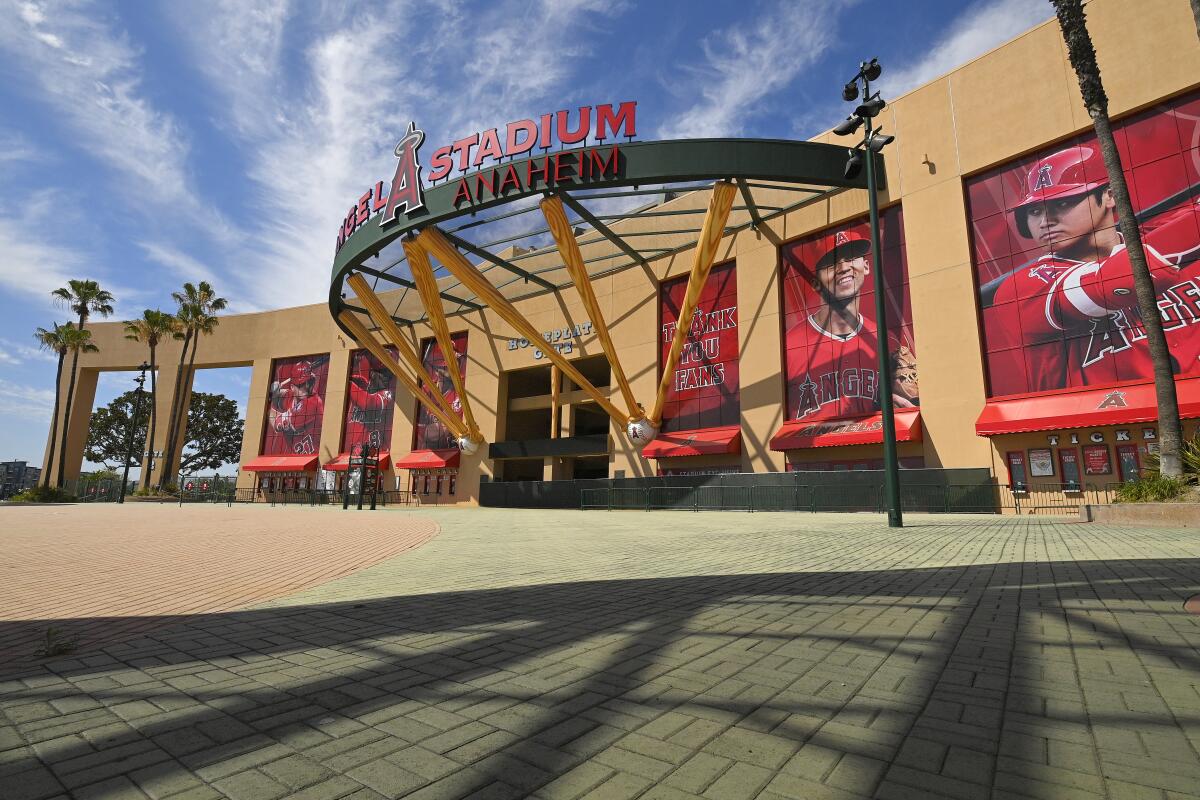Anaheim’s cash from Angel Stadium sale? $150 million, not $325 million

- Share via
In December, the Anaheim City Council agreed to sell Angel Stadium and the surrounding parking lots for $325 million. The deal was done, but the city said the structure was subject to change.
On Friday, the final cash price was announced: $150 million.
In order to entice Angels owner Arte Moreno and his development company to include close to 500 units of affordable housing and a seven-acre park within the small city to rise on the 150-acre stadium property, the city agreed to accept less than half the purchase price in cash.
The city said it valued the housing and parkland at $170 million and described the amount as a development credit, not a discount. If Moreno’s company does not deliver the housing and parkland on schedule, it must refund the city for the credited amounts.
The development agreement requires the approval of the city’s planning commission and the City Council. The planning commission is scheduled to consider the agreement on Wednesday, with the City Council expected to follow later this month.
The fair market value of a vacant site was as much as $500 million, according to a city-commissioned appraiser. But the City Council depressed that value by reinstating the Angels’ lease after the team had opted out of it, giving the Angels control over certain development on the property through as late as 2038.
Instead, Anaheim prioritized keeping the Angels in town, and letting the team develop a site that the city had failed to develop for more than half a century. The city proposed a sale price based on the depressed value of the land, subject to adjustments for community benefits that would be negotiated.
On Dec. 17, three days before the council vote, The Los Angeles Times reported that the final amount would be steeply reduced, “possibly by half.” When the council voted to approve the sale, Councilwoman Denise Barnes dissented, arguing that the city should not approve a deal without a value on whatever community benefits the city might propose to subsidize.
Mike Trout’s 13th home run pulled him even with Nelson Cruz, Luke Voit and Fernando Tatis Jr. atop the leaderboard. He’s hitting the ball as hard as ever.
On Friday, the city hailed the deal. The city had no power to compel Moreno’s company to include affordable housing or a major park within the development, Anaheim spokesman Mike Lyster said.
“This is meant to be an iconic park for an iconic part of the city,” Lyster said.
Councilman Jose Moreno, who voted against the deal in December, said he was gratified for the inclusion of affordable housing and said the subsidy of $265,000 per unit is in line with local market trends.
However, he said he was troubled that agreement allows the affordable housing to be built over 15 years when it is urgently needed now. He also said the city should adopt a law that would require developers to build affordable housing and parks, without a subsidy.
“The city is losing $175 million,” he said.
The development project is expected to include more than 5,000 homes, offices, shops, restaurants and hotels. The city envisions a ballpark neighborhood, akin to the developments that surround Wrigley Field in Chicago and Petco Park in San Diego.
The city also expects to generate more than $1 billion in tax revenue from the project by 2050, when it is scheduled for completion. Angel Stadium opened in 1966, and since then development proposals — an NFL stadium, an indoor ski/surf park, and a Western-themed village among them — have come and gone, with virtually no tax revenue generated for the city.
The estimates for tax revenue came from a study commissioned by Arte Moreno’s company. Lyster said the city did not commission an independent report because its consultants reviewed the study and found it credible.
“We have faith and confidence in the report,” Lyster said.
In a statement, Anaheim Mayor Harry Sidhu praised a deal that would keep the Angels in Anaheim through at least 2050, get the city out of the stadium business, and revitalize the city.
“We would see life-changing affordable housing, a flagship city park and exciting dining, shopping, offices hotels and entertainment, all built around baseball,” Sidhu said. “The ongoing revenue will benefit our neighborhoods for years to come.”
Marie Garvey, a spokeswoman for Arte Moreno, noted the land otherwise could have been restricted to development for another two decades.
“This agreement creates jobs, increases revenues, and starts a whole new economic engine for the City of Anaheim decades before it would have been possible under the current lease,” she said.
“We are proud that our project will play a role in addressing the shortage of affordable housing in Anaheim, and the state of California. As one of the largest, and only, inclusionary affordable housing projects in the City, we will be providing equitable living standards for residents at all economic levels. We look forward to creating an environment with a robust offering of amenities including parks, shopping, dining, entertainment, sports, and transit.”
More to Read
Go beyond the scoreboard
Get the latest on L.A.'s teams in the daily Sports Report newsletter.
You may occasionally receive promotional content from the Los Angeles Times.








